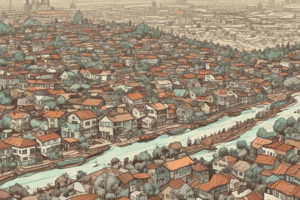Podcast
Questions and Answers
Urbanization is the process of people moving from cities to rural areas.
Urbanization is the process of people moving from cities to rural areas.
False (B)
Increased population density is a characteristic of urbanization.
Increased population density is a characteristic of urbanization.
True (A)
Natural disasters are a pull factor of urbanization.
Natural disasters are a pull factor of urbanization.
False (B)
Cultural and entertainment opportunities are a pull factor of urbanization.
Cultural and entertainment opportunities are a pull factor of urbanization.
Urbanization always leads to economic growth and development.
Urbanization always leads to economic growth and development.
Rural areas are characterized by high population density.
Rural areas are characterized by high population density.
Urbanization leads to a brain gain in rural areas.
Urbanization leads to a brain gain in rural areas.
Investing in rural infrastructure is a strategy for rural development.
Investing in rural infrastructure is a strategy for rural development.
Flashcards are hidden until you start studying
Study Notes
Urbanization
- Definition: The process of people moving from rural areas to cities and towns, leading to an increase in the population of urban areas.
- Characteristics:
- Increased population density
- Development of infrastructure (e.g. roads, buildings, public transportation)
- Growth of industries (e.g. manufacturing, services)
- Changes in lifestyle and culture
Causes of Urbanization
- Push factors:
- Poverty and lack of opportunities in rural areas
- Natural disasters or environmental degradation
- Conflict or political instability
- Pull factors:
- Job opportunities and higher wages in cities
- Access to education, healthcare, and other services
- Cultural and entertainment opportunities
Effects of Urbanization
- Positive:
- Economic growth and development
- Increased innovation and entrepreneurship
- Greater access to services and opportunities
- Negative:
- Overcrowding and strain on infrastructure
- Increased cost of living and poverty
- Environmental degradation and pollution
Rural Areas
- Definition: Areas located outside of cities and towns, characterized by:
- Low population density
- Agricultural or natural resource-based economy
- Limited access to services and infrastructure
- Challenges:
- Limited job opportunities and lower wages
- Limited access to education, healthcare, and other services
- Aging population and brain drain
Impact of Urbanization on Rural Areas
- Brain drain: Young and educated individuals leave rural areas for cities, leading to a lack of skilled workers and entrepreneurs.
- Economic decline: Rural areas may experience economic decline as industries and services move to cities.
- Changes in lifestyle and culture: Urbanization can lead to a loss of traditional rural ways of life and cultural heritage.
Strategies for Rural Development
- Invest in rural infrastructure (e.g. roads, internet, healthcare facilities)
- Promote rural entrepreneurship and small business development
- Improve access to education and training
- Foster rural-urban connections and partnerships
Urbanization
- Urbanization is the process of people moving from rural areas to cities and towns, leading to an increase in the population of urban areas.
Characteristics of Urbanization
- Increased population density in urban areas
- Development of infrastructure (e.g. roads, buildings, public transportation)
- Growth of industries (e.g. manufacturing, services)
- Changes in lifestyle and culture in urban areas
Causes of Urbanization
- Push factors:
- Poverty and lack of opportunities in rural areas
- Natural disasters or environmental degradation in rural areas
- Conflict or political instability in rural areas
- Pull factors:
- Job opportunities and higher wages in cities
- Access to education, healthcare, and other services in cities
- Cultural and entertainment opportunities in cities
Effects of Urbanization
Positive Effects
- Economic growth and development in urban areas
- Increased innovation and entrepreneurship in urban areas
- Greater access to services and opportunities in urban areas
Negative Effects
- Overcrowding and strain on infrastructure in urban areas
- Increased cost of living and poverty in urban areas
- Environmental degradation and pollution in urban areas
Rural Areas
- Definition: Areas located outside of cities and towns, characterized by low population density, agricultural or natural resource-based economy, and limited access to services and infrastructure.
Challenges of Rural Areas
- Limited job opportunities and lower wages in rural areas
- Limited access to education, healthcare, and other services in rural areas
- Aging population and brain drain in rural areas
Impact of Urbanization on Rural Areas
- Brain drain: Young and educated individuals leave rural areas for cities, leading to a lack of skilled workers and entrepreneurs in rural areas.
- Economic decline: Rural areas may experience economic decline as industries and services move to cities.
- Changes in lifestyle and culture: Urbanization can lead to a loss of traditional rural ways of life and cultural heritage.
Strategies for Rural Development
- Invest in rural infrastructure (e.g. roads, internet, healthcare facilities)
- Promote rural entrepreneurship and small business development
- Improve access to education and training in rural areas
- Foster rural-urban connections and partnerships
Studying That Suits You
Use AI to generate personalized quizzes and flashcards to suit your learning preferences.




